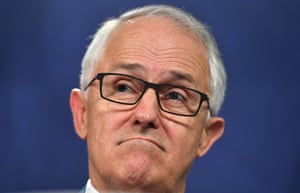The moment that summed up the political year 2017 for me came in the
first sitting week when treasurer Scott Morrison marched into parliament
brandishing a lump of coal.
“This is coal – don’t be afraid, don’t be scared”, the treasurer cried out maniacally, before passing it along his front bench where Barnaby Joyce proceeded to fondle it like Gollum his precious ring.
“This is coal – don’t be afraid, don’t be scared”, the treasurer cried out maniacally, before passing it along his front bench where Barnaby Joyce proceeded to fondle it like Gollum his precious ring.
The premeditated stunt locked the Coalition in behind a coal lobby that had been running a coordinated campaign to besmirch renewables since an extreme weather event had led to blackouts in South Australia in late 2016.
The lump of coal act was also the final surrender by a prime minister who had built a public persona around his determination to take meaningful action on climate change.
What followed was a year of inaction on energy that history will judge poorly, a running joke of reviews, thought bubbles and reports designed to placate the deniers and chancers who now direct the Coalition.
It means Australia finishes the year with little progress on energy policy save an eight-page framework likely to live up to its acronym, the inaction continuing to retard the developments of renewables to the benefit of fossil fuel interests.
While probably the most revealing finding of this year’s Essential Report shows that the public is way ahead of the politics on embracing renewables, the coal lobby intervention has actually shifted support back, and there are still large numbers of uncommitted voters ready to be wooed back to coal.
A copper-plated broadband network, a divisive postal survey on marriage equality, Tampa-era border security panics, union-bashing conspiracies, reds under the beds (only this time Chinese) – all underpinned by a blind faith in trickle down 1980s economics.
And just to throw in a punchline, the parliament was hijacked by a constitutional anachronism that rendered representatives of all the major players as being ineligible to be on the battlefield.
Yet for all its noise and fury, 2017 was a year of political stasis. We finished 2017 with exactly the same polling figures as we finished 2016 – Labor ahead with a decisive but not conclusive two party preferred advantage of 53-47.
But this does not detract from what has been a wretched year for the PM. His company tax cuts stalled, he has achieved little but a set of laws attacking his political opponents and already being seen to be open to abuse.
The marriage equality vote was a step forward for the nation, but the process was expensive and needlessly divisive, the May federal budget was rightly portrayed as Labor-lite, while a bank royal commission has been imposed on a reluctant government.
For Labor it’s been a year of hard yards with some real return on effort around its commitment to policy development. On a range of key issues, Labor has public support and brand advantage: its 50% renewables target, its crackdown on negative gearing, its commitment to reverse cuts to penalty rates, all garnering strong public support.
Opposition leader Bill Shorten’s best moments have been when he has wrapped Labor’s mission into the broader inequality story – linking the endemic tax minimisation of business and the very rich to the flat-lining wages of ordinary workers.
But while Labor finishes the year with a sustained advantage over the Coalition, a final set of Essential questions shows there is no sense of inevitably about a change of government. In a set of questions about the year just past voters are far more upbeat than over recent years.
There are still cautions over the high number of voters who see their financial situation as deteriorating, but the white-hot anger we have picked up in recent years is not as pronounced.
Likewise with expectations of the year ahead. While it’s fair to say we are not skipping into 2018, we are certainly not dreading it either.
How will this play our politically? Like most things it can break two ways.
For the government, these figures can read as a sign of reassurance, proof that the public are not arming themselves with baseball bats and turning their anger on their elected representatives.
They will take this as a cue to narrow the public debate to the self-interest of income tax cuts that served the Howard government (if not the nation) so well during the last set of economic good time.
For Labor, there’s a different read: the sense that a more optimistic nation is feeling secure enough to embrace a new wave of positive change, not just energy transition but social transition as well, that sees the role of government as doing more than just getting out of the way and letting the free market rip.
Which brings us back to our lump of coal.
When you have something as profound as the accumulated mass of our biological history in your hands what does a wise leader do? Burn it? Conserve it? Turn it into a prop for cheap laughs?
The lump of coal should remind us that everything is transformative, nothing remains the same and that clinging to the past, denying the inevitability of change is anathema to our collective history.
After a year of going nowhere, here’s to a 2018 where we find a way of meeting our historical responsibilities to do something better: both our elected leaders and we, the voting public, inextricably entwined whether we like it or not.

No comments:
Post a Comment